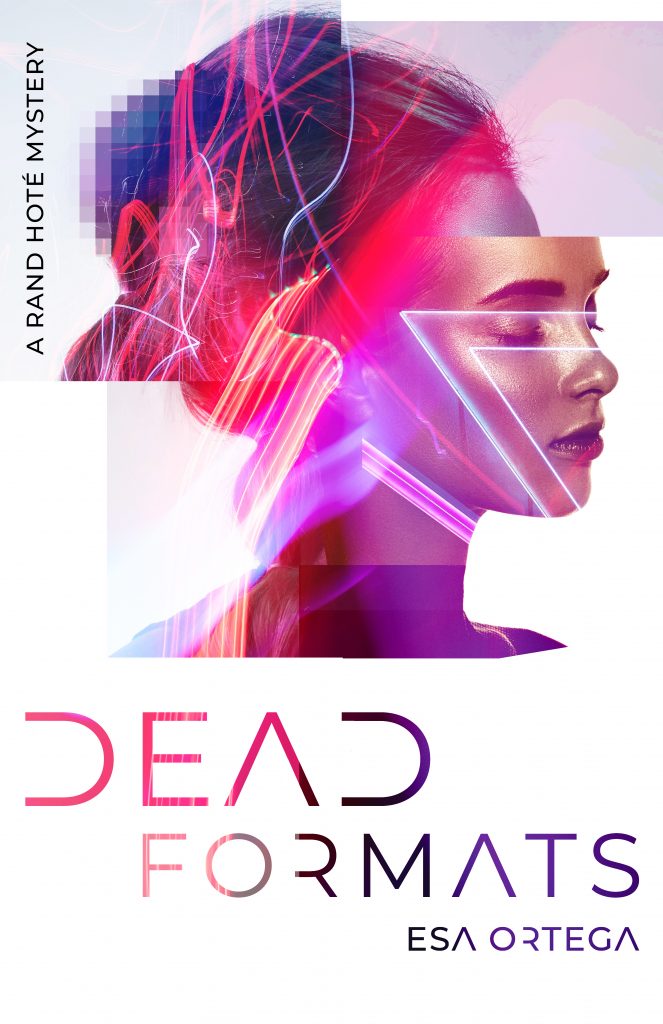
Here’s the blurb…
When holo lawyer Rand Hoté meets Tegan Kolechko, she hires him to investigate her death.
Tegan’s been resurrected as a hologram, but has no memory of the last two weeks of her life – and by 2064, being an immortal light-being is not what it used to be. Other afterlives are available, the company that generates the holos is acting suspiciously… and the holos of Light City are protesting every night.
With his repurposed sex-doll assistant and his toy-dinosaur accountant, Rand protects the holos’ rights in the courts of Light City. But when the team takes Tegan’s case on, they uncover the strands of a dark conspiracy – one that means the holos may not get to live happily ever after, after all…
Dead Formats is a twisty near-future mystery set in a gritty cyberpunk world, with snappy dialogue and inventive characters – for fans of sci-fi, detective stories and Black Mirror-style dystopias.
Here’s a selection of reviews…
“Esa Ortega is a master at creating worlds that are totally other-worldly, but also completely believable.” – Amazon reviewer
“Dead Formats is a compellingly told detective yarn, with a central mystery that gradually raises the stakes until its spectacular and satisfying conclusion.” – Amazon reviewer
“Totally hooked! Will be reading more from this author.” – Amazon reviewer
“A familiar kind of narrative… told in a way I hadn’t seen before.” – Millennial Book Review
Some of the books I read just before I had the idea for Dead Formats – Homo Deus by Yuval Noah Harari, Life 3.0 by Max Tegmark, Manna by Marshall Brain and The Age Of Em by Robin Hanson, to name four – chart the radical potential changes that our species will undergo over the next century or so. And while they don’t all share an equally optimistic view of that future, they all entertain the notion that, to some extent at least, humanity will soon outrun (or at least recast) death.
With Dead Formats, I wanted to address some of the implications suggested by this fantasy of a tech-fuelled immortality – specifically, that as soon as it was achieved, surely it would be obsessively improved upon? And if it was upgradeable, like a phone or an OS, surely it wouldn’t be long before the early versions of immortality became outmoded and redundant… at which point, perhaps millions of lost souls would be trapped in the immortal plane in a low-tech avatar or similar, watching on as their successors enjoyed an afterlife with an ever-better spec?
Here are five inspirations behind the book…
A nostalgic selection of sci-fi classics

I’ve explained some of the fiction I had in mind before I wrote Dead Formats here. These kind of inspirations may well be literary in origin, but they don’t have to be literal – often, it’s the feel or atmosphere of a book’s story world that I’m trying to emulate, rather than anything concrete or specific.
Sci-fi detective crossovers

Blade Runner will of course always be the most enduring sci-fi/detective crossover, but it’s still only one of many… plenty of writers since Philip K Dick have attempted to meld the two genres, in a variety of hugely imaginative ways.
Cyberpunk’s themes and cityscapes

Now that our everyday reality now more or less resembles the inside of William Gibson’s brain in 1984, we have ample opportunity to appreciate just how forward-thinking, wide-ranging and well thought out the cyberpunk literary genre was – and how enduring its aesthetic continues to be. Light City, the setting for most of Dead Formats, is a crystallisation of many of the generic high-tech, low-life tropes popularised by the cyberpunk writers and the cinematic worlds they inspired, namely those of RoboCop, Dark City, Gattaca and Upgrade, among many others.
Betamax horror

Immortality and mind transference are both themes in Dead Formats. And when I think of those themes I naturally gravitate towards the pirated 80s schlock horror that I used to consume at an unhealthy rate – among them The Fly and Reanimator. One scene in particular in the book owes much to the grossout horror these films fixated on… as well as adding a sideways nod to a key moment from Woody Allen’s sci-fi comedy, Sleeper.
Red Dwarf: Holoship

Turn your nose up, I don’t care… Red Dwarf tackled some hugely inventive sci-fi concepts and had amazing scripts in its early seasons. The opener of series five saw the hologrammatic Arnold Rimmer compete for a crewmember’s place onboard the elitist holoship Enlightenment – entering into a head-to-head battle of the intellects with unintended consequences…
